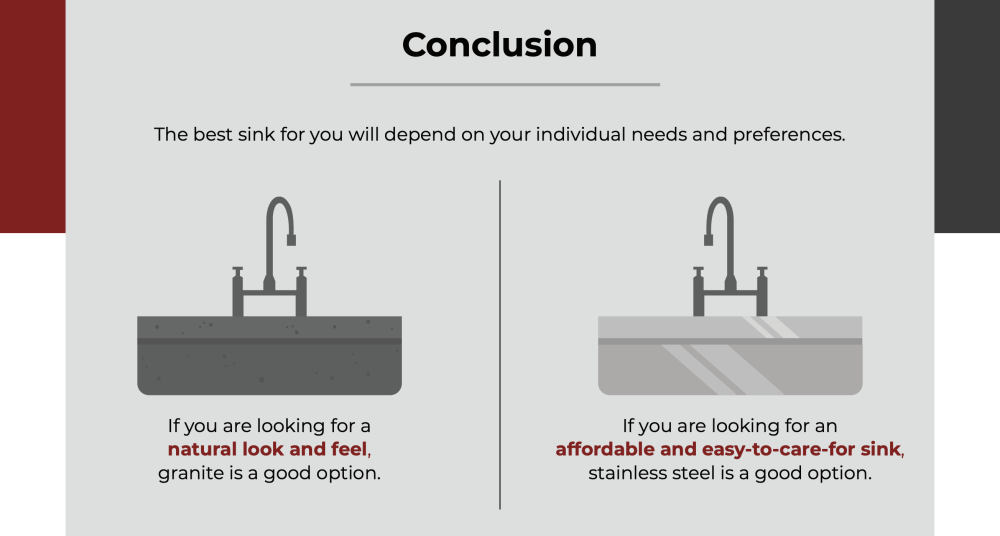
As two of the most durable kitchen sink materials, learn about the pros, cons, and differences between granite and stainless steel sinks.
Granite and stainless steel kitchen sinks both are modern and timeless, but which is better for your kitchen? And what about a natural granite sink versus a granite composite sink? If you’re having a difficult time deciding between granite and stainless, here are the pros, cons, and facts you need to know to make the best choice for your kitchen.
Granite and Granite Composite Sinks
Natural granite sinks are rare and very expensive. Typically they’re selected like a slab of granite, and very few are commercially produced. Today, granite composite sinks are a much more popular choice. Granite composite sinks are made up of 80% granite or quartz dust and 20% acrylic resin. This engineered material is molded into a sink form to create a durable sink, making it a common choice when dealing with kitchen remodel costs.
Here are a few of the pros and cons of granite composite sinks:
Pros
- A wide variety of colors to choose from
- A very durable and long-lasting choice
- Granite composite sinks cost less than other luxury sink materials
Cons
- Risk of chipping and cracking
- They require special upkeep
- They’re heavy and more expensive to install
Choose From a Variety of Colorways
Granite composite kitchen sinks beautifully complement granite countertops. They’re available in a wide range of colors, styles, shapes, and finishes. White, black, and brown are the most popular color choices. And the best part? Granite composite sinks are fade-resistant, so you don’t have to worry about your black granite sink fading over time. When compared to stainless steel kitchen sinks, granite composite sinks have many more style options.
Natural granite sinks feature natural variations of the stone throughout, but they’re not a uniform color like granite composite sinks. Many granite slabs are available in creams, tans, and grays.
Granite Composite Sinks Are Very Durable
If properly cleaned and cared for, granite composite sinks can last for 40 to 50 years. Granite composite sinks are one of the most durable sink options on the market. Over time, they can develop cracks, but these are very easy to repair during your fixture’s annual sealing. Here’s how granite composite holds up against cracks, stains, and heat:
- Cracks. Granite composite sinks are resistant to chips, dents, and scratches. However, they still can chip if you’re not careful. Always place pots and pans in your sink with care.
- Stains. Since granite composite sinks are non-porous, staining is unlikely. Though it’s recommended that you regularly clean your granite composite sink to help prevent stains.
- Heat. These kitchen sinks are heat resistant, so you can place a hot pan or dish in the sink without damaging the finish.
Natural Granite Sinks Can Crack
While granite composite sinks are very unlikely to crack, natural granite sinks can crack if they’re not sealed properly. Natural granite is very heavy, which can accidentally lead to cracks during installation. Once installed, it’s important for homeowners to annually seal and care for their granite sink to prevent it from cracking. Also, never drop heavy dishware, pots, or pans in your sink, which can cause accidental cracking.
Cleaning Granite & Granite Composite Sinks
Granite Composite
To maintain your granite composite sink, regularly clean your sink with warm water and soap to prevent a buildup of food and debris. The following cleaners are safe to use on granite composite sinks:
- Gentle dish soap
- Baking soda
- Vinegar
Do not use full-strength bleach or a Magic Eraser on your granite composite sink. However, you can soak the sink with a 50/50 bleach and water mixture. With regular cleanings, granite composite sinks are easy to keep clean because of their non-porous surface.
Natural Granite
Natural granite sinks need to be sealed annually to protect them from stains. To keep your granite shining, you can use these cleaners on your natural granite sink:
- Gentle dish soap
- Baking soda
- Granite-formulated clearers
Don’t use harsh acids, like vinegar, lemon juice, or bleach, on your granite sink. These ingredients can dull or damage your granite sink’s finish. Also, avoid abrasive cleaners like steel wool and Magic Erasers.
Here’s Why Your Granite Sink is Turning White
One common problem people have with black granite or granite composite sinks is they may turn white over time. This is caused by mineral deposits from hard water—if your home has hard water, then you may notice these white areas. Fortunately, water deposits can be removed with water and a mild detergent mixture. Besides some light white residue, black granite composite sinks are easy to keep clean.
Stainless Steel Sinks
Stainless steel is the most popular material for kitchen sinks. It’s incredibly durable and is made in a variety of styles and configurations. Stainless steel is easy to keep clean and lasts for many years with proper care. While stainless steel sinks are known for their silver appearance, they’re also available in black, brass, bronze, and copper. Stainless steel kitchen sinks are made in a variety of finishes, including brushed, mirrored, polished, matte, satin, hammered, and more.
Here are some of the pros and cons of stainless steel sinks:
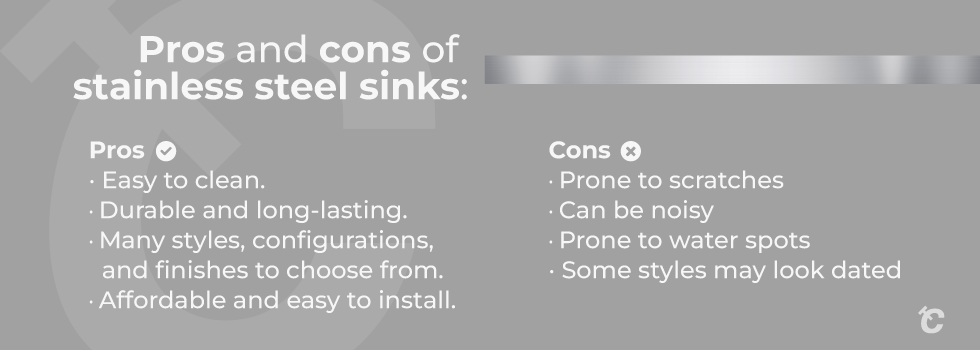
Pros
- Easy to clean with most household ingredients
- Durable and long-lasting
- Many styles, configurations, and finishes to choose from
- Affordable and easy to install
Cons
- Prone to scratches
- Lower quality stainless steel sinks can be noisy
- Prone to water spots
- Some styles may look dated
Gauge and Quality Matter

Not all stainless steel sinks are made of the same quality. If you’re shopping for a stainless steel sink, you may see the word “gauge” show up with a number. Gauge refers to how thin or thick the sheet of stainless steel is. So, lower gauges, such as 14 to 18, are very durable and high-quality. While higher gauges, such as 18 to 23, are less durable and may not hold up as well over time.
In addition to stainless steel gauges, the quality of the steel also matters. Two of the most common stainless steel sink grades are 18/8 and 18/10 stainless steel. These grades refer to how much chromium and nickel are contained within the steel. Grade 18/8 is highly rust-resistant, while 18/10 is rust-proof and holds its polish well.
Stainless Steel is Tough and Long-Lasting
Depending on the gauge, grade, brand, and quality of your stainless steel sink, they can last between 15 and 30 years. And just because stainless steel is one of the most affordable materials, doesn’t mean you have to compromise on quality. Here’s how well stainless steel sinks hold up against scratches, stains, and heat:
- Scratches. Stainless steel sinks are prone to scratching. However, different sink textures and finishes are better at disguising scratches than others. If your sink does scratch, you can buff it with flour or olive oil to reduce the appearance of scratches and make the sink shine.
- Stains. Stainless steel sinks are very unlikely to stain. Though, it’s common for them to get water spots or light staining if they’ve been cleaned with a cleanser that contains bleach.
- Heat. Stainless steel sinks are heat-proof, so you can sit hot pans and dishes in the sink without damaging the metal.
How to Clean Stainless Steel Sinks
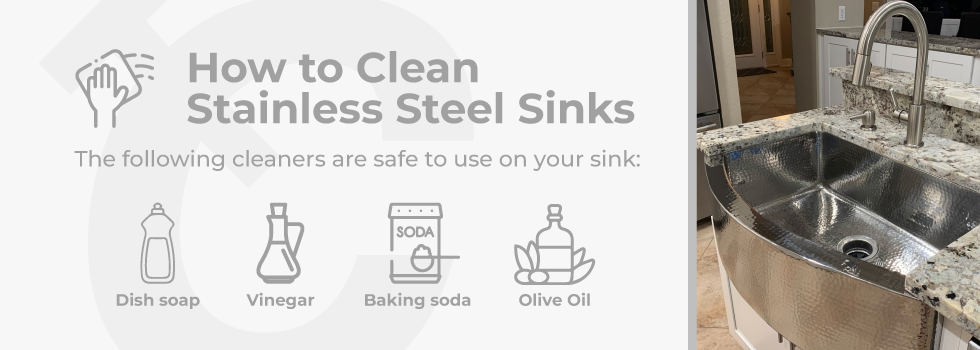
Because stainless steel sinks have a non-porous surface, they’re very easy to keep clean. Always be careful when you’re cleaning your sink to prevent scratching and potential damage. The following cleaners are safe to use on your sink:
- Dish soap. For daily cleaning, wash your sink with warm water and dish soap on a soft cloth or sponge.
- Vinegar. If you’ve noticed that your stainless steel sink is looking dull, vinegar will leave the surface sparkling.
- Baking soda. For deep cleaning, rub baking soda into your sink with a soft cloth or sponge.
- Olive oil. If you want to minimize scratches and leave your sink looking shiny, rub a little olive oil into the sink after cleaning with soap and water.
Never use bleach, steel wool, Magic Erasers, Comet, or abrasive cleaners on your stainless kitchen sink. These items can scratch the sink’s surface and create a dull haze over time.
Are Granite Sinks Better than Stainless Steel Sinks?
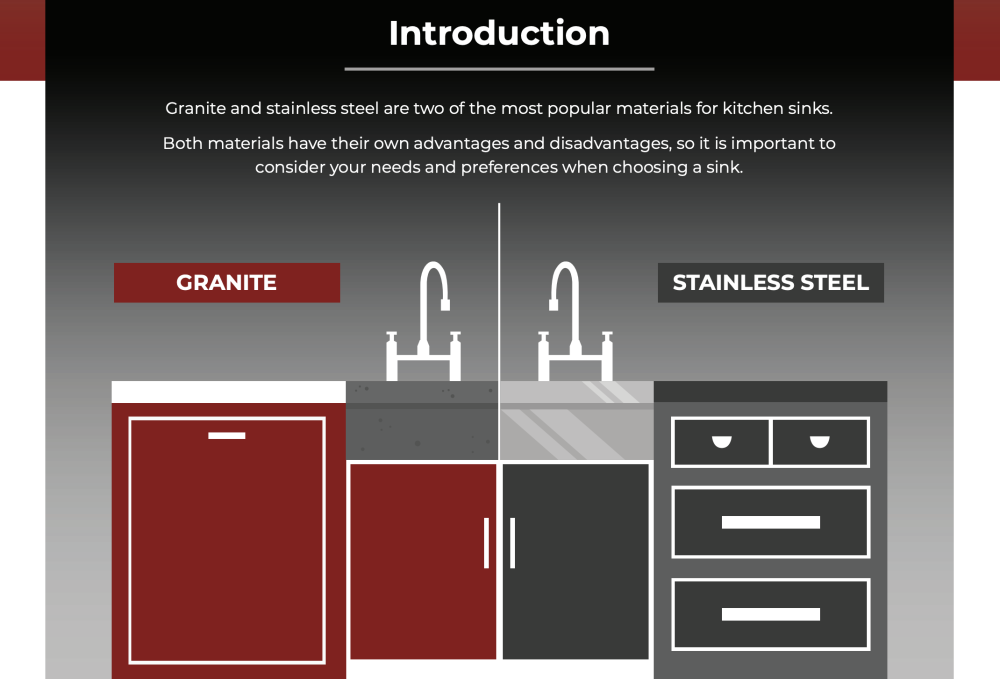
Stainless steel and granite kitchen sinks are very different from each other. They have their own advantages and disadvantages, but neither is better than the other. The best option for your kitchen depends on the style of your kitchen, your budget, and how long you’d like it to last. Currently, stainless steel is the most popular option in kitchen sinks, while granite composite sinks are second on the list. Here’s how granite, granite composite, and stainless steel sinks compare against cost, style, and durability.
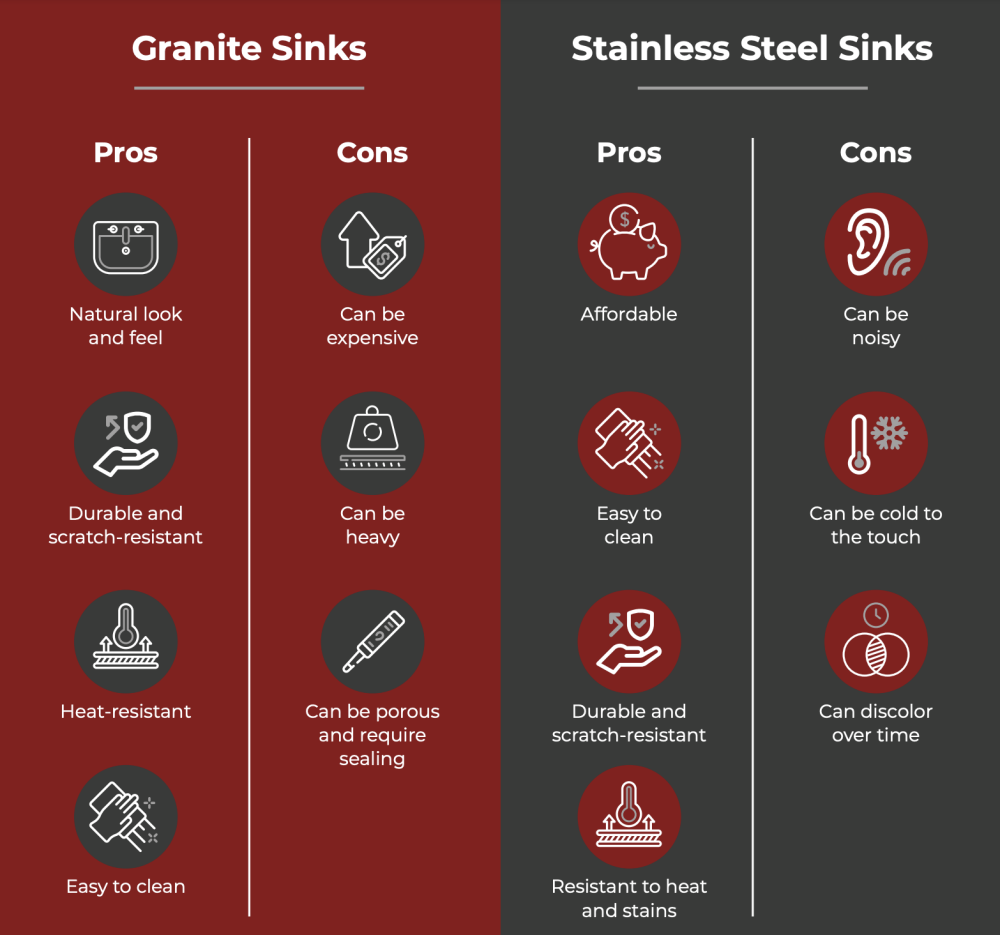
Cost
A stainless steel sink costs between $200 and $1,500, while a granite composite sink costs between $300 and $600, and natural granite sinks cost between $600 and $2,500. While the price varies greatly depending on the quality, brand, and finish, stainless steel and granite composite kitchen sinks tend to be the more affordable options. In general, natural granite sinks are much more expensive than stainless steel and granite composite.
Style
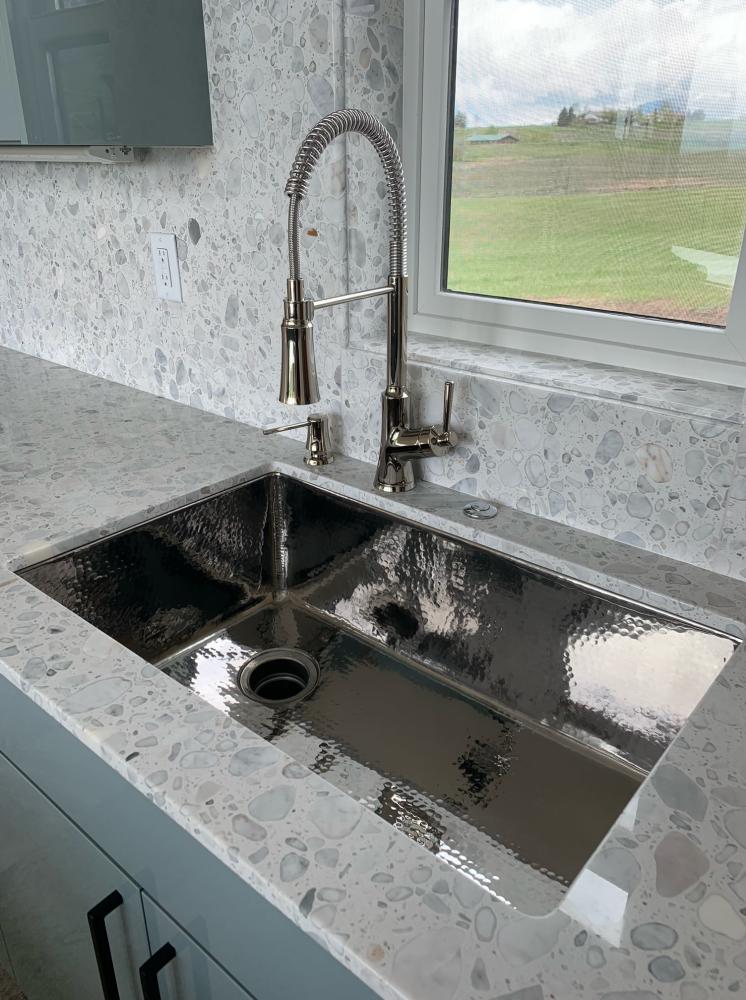
Stainless steel, granite composite, and natural granite kitchen sinks are all vastly different when it comes to style. Though, granite composite and stainless steel sinks are ranked as two of the top sink materials for kitchens in upcoming years. In terms of trends, stainless steel or granite composite sinks may help the resale of your home.
If your kitchen has stainless steel appliances, then a stainless steel sink may make more sense for your space. If you have granite countertops and want a colored sink to complement the granite, then a granite composite or natural granite sink may be best for your kitchen style.
Durability
Granite composite sinks can last between 40 and 50 years, while stainless steel sinks will likely last between 15 and 30 years. Natural granite sinks can last longer than 40 years if they’re properly sealed and cared for. All of these sink options are very durable and will likely last the life of your current kitchen design. Though, keep in mind that granite composite sinks and natural granite sinks may require more upkeep than stainless steel. So, if annual sealing and maintenance don’t bother you, then a granite sink can be a worthy choice.
Are you ready to bring the kitchen of your dreams to life? If you’re thinking of installing a stainless steel sink in your kitchen, CopperSmith is here to help. We offer sustainable, customizable stainless steel sinks in high-end styles and finishes. Choose from seamless undermount sinks, farmhouse sinks, single basin sinks, double basin sinks, and so much more.
Contact our team today to learn more about our kitchen sinks, and why customers love our heavy gauge metals, which are designed to last for decades to come.
